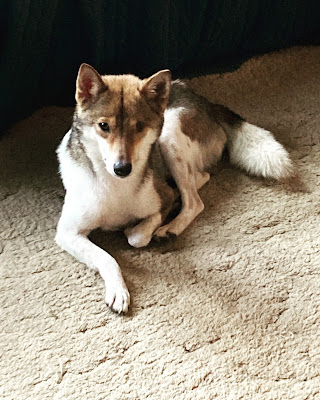See this innocent-looking face?
In their eyes, Shibas can take on the world no matter how big the foe or the task. They are dominant with other dogs and do not usually get along well with other "bossy" dogs of the same sex. Many Shibas will, however, get along great with another dog or cat that agrees the Shiba is boss.
Shibas always like to be in charge; their favorite word is "mine." Although not "barky" dogs, they do yodel and scream anytime they feel they are being violated, such as nail trimming, bathing, and leash training. Shibas can be runners. The Shiba Inu is a natural hunter. Given a chance, Shibas will take off in search of game. It is advisable to never trust your Shiba off-lead unless in a fenced yard.
The Shiba's least favorite word is "come." They will usually take your number and get back to you, when called.
Shibas have a mind of their own. While it is possible to obedience train a Shiba, it is a challenge. Tell him to sit and he sits . . . sometimes. If there is something in it for him, and it is convenient at the time.
The first thing I thought after reading this (besides "Amen!") was how interesting it is that you can characterize an entire breed like this, irrespective of how an individual animal was raised. Not that prior treatment is inconsequential; one thing that Cleo still exhibits is wariness from having been abused as a puppy (you'll notice if you look closely at the photograph that she's missing her left eye). But the fact that you can draw a detailed picture of a typical Shiba personality like this indicates something fascinating -- that a great deal of dog behavior is controlled by genetics, not by training.
Way back in 2008, a paper in The American Journal of Human Genetics considered this phenomenon, and suggested that these kinds of behavioral trends are caused by a fairly small number of genes (and speculated that the same sort of thing may be true of human personality types). A more recent 2019 study looked specifically at canine aggression and fearfulness, and found that those have between sixty and seventy percent heritability. Consider how many breeds you characterize in a word or two -- the friendliness of Golden Labs, the intelligence and always-on-the-job attitude of a Border Collie, the aggressiveness (despite its size) of a Chihuahua. And Shibas are not the only ones who have built-in, almost certainly genetic, difficult behaviors; a friend of mine once told me that if you want an exercise in frustration, try to house-train a Cocker Spaniel. This kind of thing has an unfortunate effect on dog owners who are unprepared or uninformed. A particularly sad example is that after the movie One Hundred and One Dalmatians aired, there was a run on Dalmatian puppies -- and six months later, an influx of Dalmatians being given up at shelters. Far from the cute, cuddly stereotype of the puppies from the movie, as a breed Dalmatians tend to be high-stung, nervous, reserved, and aggressive; they are considered to be one of the top-ten breeds most likely to bite, and a great many of the people who adopted a Dalmatian puppy very quickly regretted their choice.
I say this knowing, of course, that "unprepared and uninformed" is a pretty good description of my wife and I when we adopted Cleo. However, in our defense I have to add that we're experienced dog owners with a history of adopting rescues, just about all of whom have had bad pasts and the attendant behavior problems -- and we have yet to own a dog who hasn't turned out to be a wonderful and charming, if quirky, companion. We strongly believe that pet adoption is forever; if you can't commit, don't adopt. (I do reconsider that stance on occasion when Cleo starts screaming in the middle of the night, but those lapses are short-lived.)
So we're not expecting Cleo's personality to change, and indeed, we don't want it to. She's a charmer even when she's being a pain in the ass. We'd like to modify some of it -- such as the twice-aforementioned barking for something in the wee hours -- but by and large, those kinds of characteristics are what make dogs interesting.
It reminds me of the famous quote from John Heywood, "What's bred in the bone comes out in the flesh." There's a lot of truth to that, for better or worse. For better at the moment; right now, Cleo is cuddled up at the foot of the bed, paws twitching as she dreams of chasing squirrels. And she's already become part of the family, difficulties and all. Whatever the source, each dog's personality is as rich and varied as each person's is, something I've come to appreciate more and more with every dog we've adopted. And we've always been rewarded tenfold by having pets -- receiving love for kindness, devotion for care, deep trust for patience.
For me, that makes it all worthwhile.
**************************************



